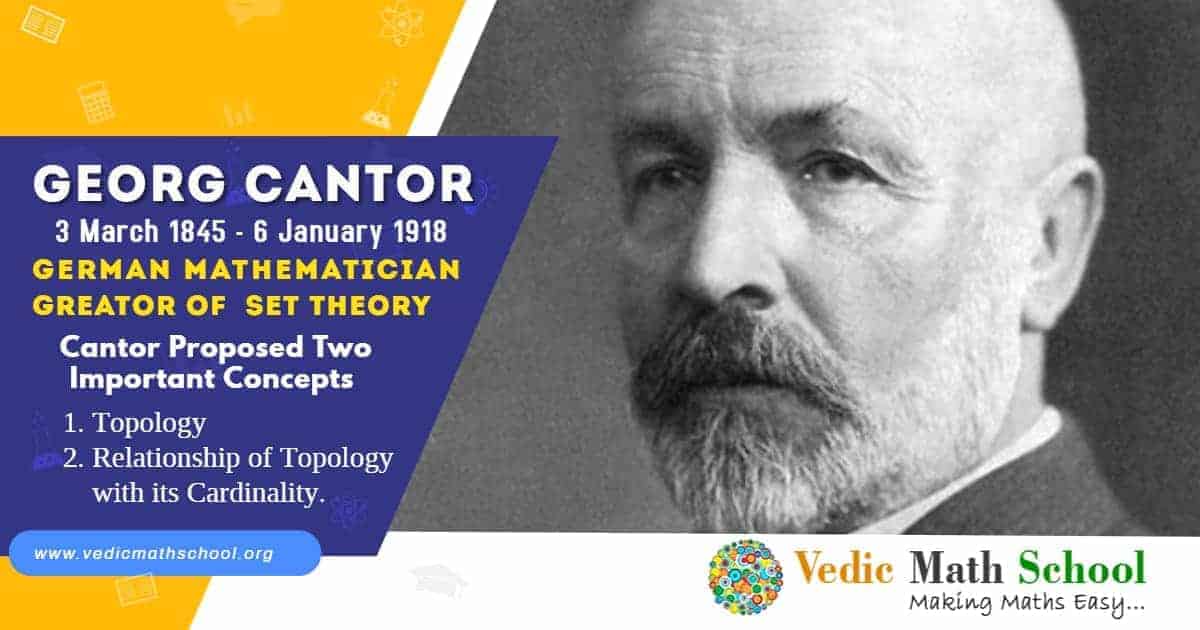Georg Ferdinand Ludwig Philipp Cantor was a German mathematician. He was born on 3 March 1845. He formulated set theory, which is now considered as the fundamental theory in mathematics.
He died on January 6, 1918.

Georg Cantor LifeHistory
Georg Cantor was born in the western merchant colony of Saint Petersburg, Russia in 1845. He was born and brought up there till he was eleven years old.
Georg Cantor Family Background
- He was the oldest of six children.
- His grandfather was a musician and soloist in a Russian imperial orchestra.
- His father was a member of the Saint Petersburg stock exchange.
- In 1874, He got married to Vally Guttmann.
- He had six children
Georg Cantor Educational Background
- He shifted to Germany in 1856, to places like Wiesbaden and Frankfurt to start his educational career.
- In 1860, Cantor got graduated with first-class from the Realschule in Darmstadt.
- In August 1862, he then graduated from the “Höhere Gewerbeschule Darmstadt”
- In 1862, Cantor joined the Swiss Federal Polytechnic.
- In June 1863, He joined the University of Berlin. He got learnings from great mathematicians like Leopold Kronecker, Ernst Kummer, and Karl Weierstrass.
- In 1866, He joined the University of Göttingen,
- In 1886, He joined the center for mathematical research.
- In 1867, He received his doctorate in mathematics.
- He joined as a Mathematics professor at the University of Halle. He spent his entire career there.
- In 1872, He was promoted to extraordinary professor.
- In 1879, He became a full professor in mathematics.
Georg Cantor Books
Books are written by Cantor:
- The Continuum, and Other Types of Serial Order: With an Introduction to Cantor’s Transfinite Numbers.
- La théorie Bacon-Shakespeare: le drame subjectif d’un savant.
- Adrenomedullin in Cardiovascular Disease.
- Contributions to the Founding of the Theory of Transfinite Numbers.
- The Continuum – Scholar’s Choice Edition.
Other Mathematicians like Georg Cantor
There are many other German Mathematicians like Him like: Carl Friedrich Gauss, Bernhard Riemann who has worked to improve the level of Mathematics in German.
Few Mathematicians who were been the Royal Society are: David Hilbert
Contributions of Georg Cantor in Mathematics
- In 1867, At the University of Berlin, Cantor submitted his dissertation on number theory.
- Cantor proved that there are infinitely possible sizes for infinite sets.
- George proved that as compared to the set of natural numbers, the set of real numbers is “more numerous”.
- He explained the importance of one-to-one correspondences in set theory.
- He was the first who has defined finite and infinite sets.
- Cantor proposed two important concepts
- Topology
- Relationship of topology with its cardinality.
- He explained the Cantor set.
- George laid fundamental steps in set theory.
- He formed the Cantor’s theorem.
- Cantor made the arithmetic of infinite sets, called ordinals and cardinals.
- He introduced the Continuum hypothesis.

Interesting facts about Georg Cantor
Few of the Interesting facts about him
- He spent most of his life in hardship and poverty, but he never gave up his passion and love for Mathematics.
- He used to teach in the girls’ school.
Awards and Rewards under the name of Georg Cantor
Few of the honors given to Georg:
- Georg was been awarded by Sylvester Medal by the Royal Society. This award is the highest honor that is given to mathematicians for their great work on mathematics.
- For his thesis, Cantor was awarded the requisite habilitation.
FAQ About Georg Cantor
What did Georg Cantor discover?
Cantor founded set theory & introduced the mathematically meaningful concept of transfinite numbers, indefinitely large but distinct from one another.
How did Cantor die?
On January 6, 1918, Cantor had a deadly heart attack, in the Sanatorium.
Where did Cantor live?
Georg lived in the Russian Empire, St Petersburg, and the German Empire.
Where did Cantor go to school?
Cantor had studied in these schools: Humboldt University of Berlin, Technische Universität Darmstadt and ETH Zürich.
Who is the father of a real number?
Georg Cantor is considered as the father of Real Numbers.
References:
You can learn about this mathematician and his works from Stanford University.


